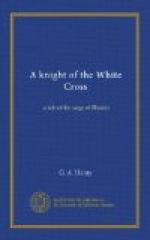Just as Warwick’s right had outflanked the king’s left, so his own left was outflanked by Gloucester. Warwick’s troops fought with great bravery, and, in spite of the disaster to his centre, were holding their ground until Oxford, returning from his pursuit of the king’s left, came back through the mist. The king’s emblem was a sun, that of Oxford a star with streaming rays. In the dim light this was mistaken by Warwick’s men for the king’s device, and believing that Oxford was far away on the right, they received him with a discharge of arrows. This was at once returned, and a conflict took place. At last the mistake was discovered, but the confusion caused was irreparable. Warwick and Oxford each suspected the other of treachery, and the king’s right still pressing on, the confusion increased, and the battle, which had been so nearly won by the Earl, soon became a complete defeat, and by ten in the morning Warwick’s army was in full flight.
Accounts differ as to the strength of the forces engaged, but it is probable that there was no great inequality, and that each party brought some fifteen thousand men into the field. The number of slain is also very uncertain, some historians placing the total at ten thousand, others as low as one thousand; but from the number of nobles who fell, the former computation is probably nearest to the truth. Warwick, his brother Montague, and many other nobles and gentlemen, were killed, the only great nobles on his side who escaped being the Earls of Somerset and Oxford; many were also killed on Edward’s side, and the slaughter among the ordinary fighting men was greater than usual.
Hitherto in the battles that had been fought during the civil war; while the leaders taken on the field were frequently executed, the common soldiers were permitted to return to their homes, as they had only been acting under the orders of their feudal superiors, and were not considered responsible for their acts. At Barnet, however, Edward, smarting from the humiliation he had suffered by his enforced flight from England, owing to the whole country declaring for his rival, gave orders that no quarter was to be granted. It was an anxious day at St. Albans, where many ladies whose husbands were with Warwick’s army had, like Dame Tresham, taken up their quarters. It was but a few miles from the field of battle. In the event of victory they could at once join their husbands, while in case of defeat they could take refuge in the sanctuary of the abbey. Messengers the night before had brought the news that the battle would begin at the dawn of day, and with intense anxiety they waited for the news.
Dame Tresham and her son attended early mass at the abbey, and had returned to their lodgings, when Sir Thomas rode up at full speed. His armour was dinted and his plume shorn away from his helmet. As he entered the house he was met by his wife, who had run downstairs as she heard his horse stop at the door. A glance at his face was sufficient to tell the news.




